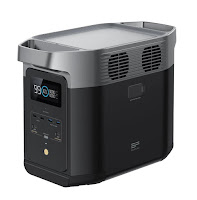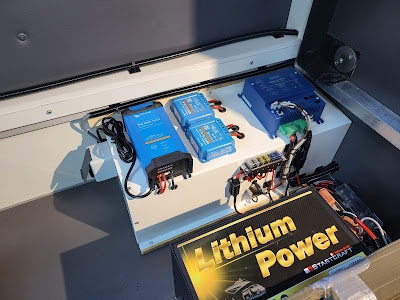- Get link
- X
- Other Apps
- Get link
- X
- Other Apps
Today I would like to compare how well these battery boxes perform compared to a homemade project, at least on paper. And also look at the advantages and disadvantages, not ignoring the cost side.
We will compare the high-quality components with a similarly equipped Ecoflow Delta2, which we have already presented here.
For the comparison, I only choose really good components, those that I would currently use for a DIY project myself. Here's my selection of components, I'm already excited!
The power supply in the touring vehicle. A DIY project vs an Ecoflow Delta2 - which battery or power supply is better?
125 USD, 1.5 kg weight
EDECOA 2000w inverter 12v 230v voltage converter or inverter
300 USD, 4.0kg weight
2 x solar charge controller MPPT 75/15 Victron Energy 12V 15A
200 USD, 1 kg weight
Shore power charger Victron Energy 230V, 12 V/30A-3
220 USD, 1.4 kg weight
100Ah LiFePO4 battery ECO-WORTHY 12.8V (3000 times deep cycles, BMS)
480 USD, 11.5 kg weight We have 19.4kg with these components alone, the wiring and fuses should increase the whole project to approx. 21kg. The components cost $1,322.04, so the final cost is expected to be around $1,400.
The power supply in the touring vehicle. A DIY project vs an Ecoflow Delta2 - which battery or power supply is better?
And here is the device for comparison:
 Ecoflow Delta2
Ecoflow Delta21024 Wh battery (expandable with additional batteries)
400 x 211 x 281 mm (length x width x height)
5 year guarantee
LiFePO4 battery
Service life: after 3,000 cycles up to 80+% capacity
Meaningful battery monitor (display & app)
12 kg weight, purchase price $ 999.00
Here is a tabular comparison of values, costs and weight. These values are certainly not the decisive ones, but more on that later.
The power supply in the touring vehicle. A DIY project vs an Ecoflow Delta2 - which battery or power supply is better?
Pros and cons of DIY and finished product
The Ecoflow package is hard to beat for space and weight. And there are also some key data, such as faster charging via shore power, strong charging via USB-C. In my article on the Delta2, I was even able to outline ways to hang a booster in between the 12v charge in the vehicle.
Do-it-yourself offers significantly more possibilities to adapt the performance to the requirements. More solar power, more shore power - everything is possible with the right components, but of course it also weighs a lot more.
Especially in the area of 12v charging via booster / alternator is possible here with 50 amps, that's a nice 600 watts. Even with the 12v consumers, self-construction is ahead. If you need a lot of power, such as an Elgena hot water boiler with 300w over 12 volts, you need 25A of power
The question arises here to what extent the operation of power-hungry devices via 12v is not outdated.
Because the Elgena hot water boiler is also available as a 12v or 220v device, or even as a combination device. The increasingly popular cooking with induction, where the higher-quality devices such as Sterling can only be found on a 210v basis. 220v is also used for the air conditioning systems, the so-called Dometic 12 volt connection packages for air conditioning systems also contain an inverter or inverter solution on closer inspection.
Conclusion
When it comes to price, the Ecoflow battery solution wins, but only at first glance. Because over the years you can exchange individual products, recycle them, sell them, something that is not possible with the Ecoflow. The Ecoflow Delta2 is completely disposed of after N years, so the individual components can perform longer. When it comes to redundancy/repairable, the DIY solution wins - but if you follow the calls for help in the forums and social media - then there are more "calls for help" with the DIY projects, usually with an expensice repair - with a defective battery.
In terms of performance, it usually depends on the requirements as to which solution can cover them better. For the portability the ecoflow wins, you can easily use it where you need it.
You have to be able to handle the space and additional weight of a DIY. Be prepared to familiarize yourself with it and be able to maintain such a system on the go, otherwise you will probably be more relaxed with an off-the-shelf box.
The Ecoflow package is hard to beat for space and weight. And there are also some key data, such as faster charging via shore power, strong charging via USB-C. In my article on the Delta2, I was even able to outline ways to hang a booster in between the 12v charge in the vehicle.
Do-it-yourself offers significantly more possibilities to adapt the performance to the requirements. More solar power, more shore power - everything is possible with the right components, but of course it also weighs a lot more.
Especially in the area of 12v charging via booster / alternator is possible here with 50 amps, that's a nice 600 watts. Even with the 12v consumers, self-construction is ahead. If you need a lot of power, such as an Elgena hot water boiler with 300w over 12 volts, you need 25A of power
The question arises here to what extent the operation of power-hungry devices via 12v is not outdated.
Because the Elgena hot water boiler is also available as a 12v or 220v device, or even as a combination device. The increasingly popular cooking with induction, where the higher-quality devices such as Sterling can only be found on a 210v basis. 220v is also used for the air conditioning systems, the so-called Dometic 12 volt connection packages for air conditioning systems also contain an inverter or inverter solution on closer inspection.
Conclusion
When it comes to price, the Ecoflow battery solution wins, but only at first glance. Because over the years you can exchange individual products, recycle them, sell them, something that is not possible with the Ecoflow. The Ecoflow Delta2 is completely disposed of after N years, so the individual components can perform longer. When it comes to redundancy/repairable, the DIY solution wins - but if you follow the calls for help in the forums and social media - then there are more "calls for help" with the DIY projects, usually with an expensice repair - with a defective battery.
In terms of performance, it usually depends on the requirements as to which solution can cover them better. For the portability the ecoflow wins, you can easily use it where you need it.
You have to be able to handle the space and additional weight of a DIY. Be prepared to familiarize yourself with it and be able to maintain such a system on the go, otherwise you will probably be more relaxed with an off-the-shelf box.
This article is also available in german language.
Transparency information: Some links contain affiliate links, we will then receive a commission if you make a purchase. You will not incur any additional costs.
Transparency information: Some links contain affiliate links, we will then receive a commission if you make a purchase. You will not incur any additional costs.
You might also be interested in the following articles:
Market overview: Portable parking heater for the roof tent and caravan
Market overview: All about baking in the travel vehicle with the oven
Gas adapter for the use of gas cartridges in CampingGaz vehicles
Which battery based air compressor is suitable for us travelers?
4x4 recovery kit: the suitable setup for solo travelers
The perfect folding travel toilet for a clean deal.
Which apps help us while traveling? Why, when and where?
Market overview: Portable parking heater for the roof tent and caravan
Market overview: All about baking in the travel vehicle with the oven
Gas adapter for the use of gas cartridges in CampingGaz vehicles
Which battery based air compressor is suitable for us travelers?
4x4 recovery kit: the suitable setup for solo travelers
The perfect folding travel toilet for a clean deal.
Which apps help us while traveling? Why, when and where?
- Get link
- X
- Other Apps




Comments
Post a Comment